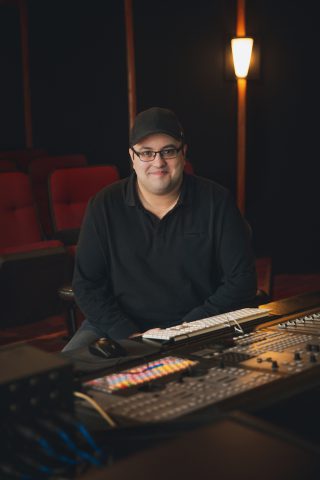Winner of the 2021 SOCAN Foundation Awards for Emerging Screen Composers, Montréal composer, arranger, and musical director Medhat Hanbali describes himself as a film buff who makes music. It’s a way of underlining that his profession, screen composer, implies an intimate knowledge of cinema, “in the same way that you need to know video games if you’re going to compose for that medium,” he says, in a conversation about the trade and how it’s learned.
 “I always say that composing music for film is like designing a garment for a supermodel,” says Hanbali. “You have to take the supermodel’s measurements to create a garment that is tailored to them uniquely,” and in the same way, adjust the music “frame by frame” so that it fits a precisely to the scene, taking into account the characters, locations, shot and camera movement.”
“I always say that composing music for film is like designing a garment for a supermodel,” says Hanbali. “You have to take the supermodel’s measurements to create a garment that is tailored to them uniquely,” and in the same way, adjust the music “frame by frame” so that it fits a precisely to the scene, taking into account the characters, locations, shot and camera movement.”
It’s tailor-made music, which we don’t hear enough of in Québec, laments the composer. After studying jazz and pop composition, and then digital music at Université de Montréal, Hanbali earned a Master’s degree in Film Music Composition at the prestigious Berklee College of Music.
He firmly believes that teaching of film music composition should be done by practitioners, and this is reflected in the works composed for film and television here. “Composers don’t learn enough about film,” he says. “How is it that someone who graduates from university, and ends up in the film industry, doesn’t really know how to speak its language? You have to understand the medium you’re working in, and the same goes for TV.” Television is a universe in which Hanbali has evolved, notably by composing the music for Si on s’aimait encore (TVA) and Mouvement Deluxe (Teletoon).
“We don’t have a strong soundtrack culture – there aren’t many specialists like Michel Corriveau, for example,” he says. “In Québec, we often promote a star system: we hire stars to create music for TV shows, rather than specialists, and these stars very often come from the world of songwriting. They’ll be asked to compose a bank of music, and the production company will draw from it for its editing. I call that making music videos; it’s not screen composing.”
“We tend to confuse picturesque music and screen composing,” says Hanbali. “Let’s use this comparison: it’s like not being able to tell the difference between a poet and a lyricist. It’s not because your stuff has rhymes and imagery that you’re a lyricist,” whereas the lyrics have to meld with the music, in his example. Composing for the movies or television “is imagining at what precise moment the music needs to occupy more or less space, how it interacts with the image, the frame or even the angle of the shot,” he says.
And, obviously, fulfilling the needs of the directors. That, to Hanbali, is a creative engine: “Creating music with absolute freedom is a handicap, for me; I work better within a set of constraints. I need a well-defined sandbox to play in. Constraints, whether they’re time-related, budgetary, stylistic, creative, or whatever, are stimulants for my imagination. This is what makes screen composing so exciting: each mandate is a whole new adventure.”
Maybe it’s just an impression, but it feels like today’s filmmakers are looking for atmospheric music rather than big themes that stay with you, we point out. “A composer always has the leeway to compose big themes,” says Hanbali. “I believe there are many issues at play here. This is due to the ever-decreasing time allotted to composition: we often have six to eight weeks to make a feature film, which means composing, arranging, recording, mixing, and so on. Composers work under deadlines that are simply insane. Then there’s the use of what we call temp tracks,” which is to say music borrowed from elsewhere, applied to the images during an initial edit, which serves as a reference point for the composer. “They’ll say, ‘Write something that sounds like that,’ and I’m supposed to come up with something that matches those criteria, but without really knowing what the director likes or needs.
“I remember when Denis Villeneuve directed Arrival,” he says. “Countless projects after that used Arrival’s music as temp tracks. It always cracks me up when I hear that piece of music in other projects! The same goes with Stranger Things: after that came out, everyone wanted ‘80s-sounding stuff!”
Medhat Hanbali will be giving a training session for the Société Professionnelle des auteurs et des compositeurs du Québec (SPACQ) on March 2 and 3, 2024, « Démystifier le métier de compositeur à l’image et gagner en vitesse de création » (“De-mystifying the job of screen composer and gaining creative speed”). For more information, or to register, visit the SPACQ website.